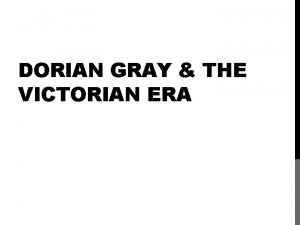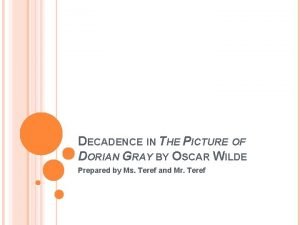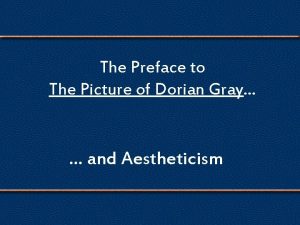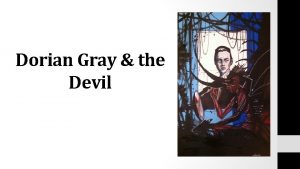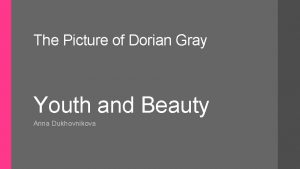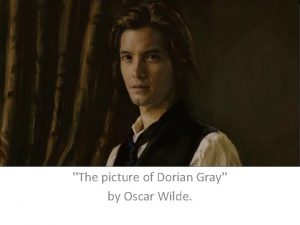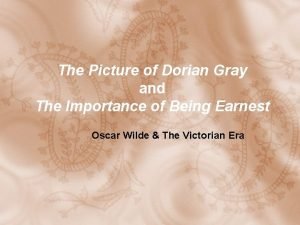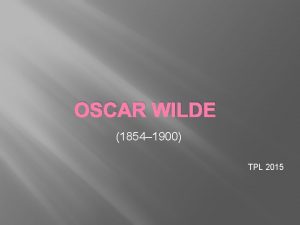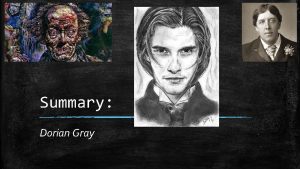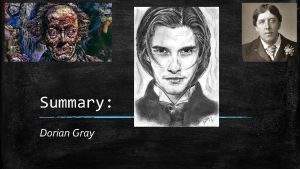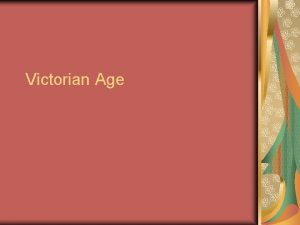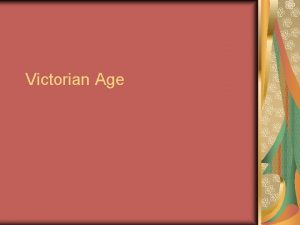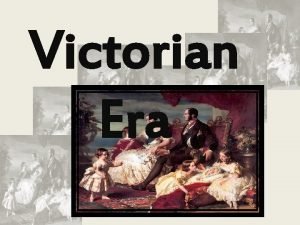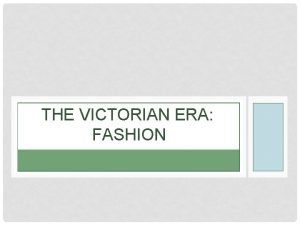DORIAN GRAY THE VICTORIAN ERA THE VICTORIAN ERA











- Slides: 11

DORIAN GRAY & THE VICTORIAN ERA

THE VICTORIAN ERA Crime • On the rise • Prostitution, violent crime, theft • Glorified in the newspapers, became an entertainment of sorts • Jack the Ripper • First serial killer • Prompted media obsession • Brutal & public punishments Industrial Revolution • Impressed by science & progress • Technology was central to their way of life • Reinforced class distinctions • Rapid urbanization

THE VICTORIAN ERA Social Class & Gender Roles • 4 class distinctions • Upper, middle, lower, under • Very strict gender roles • Men were smart and cultured, women were to be seen and not heard Sexuality • Unacceptable to be homosexual • High standards of personal morality • Prostitution was unacceptable, but were very prevelant Family & Home Life • Housing was limited and very expensive • Resulted in a lot of slums OR obscenely wealthy folks living in giant mansions • Lots of child labor

THE VICTORIAN ERA Aesthetics • An intellectual and art movement that supported the aesthetic values of a culture • Decadent • Believed that arts should convey refined sensual pleasure, rather than convey any sort of moral message • Believed art had no purpose, needed only to be beautiful • Sometimes referred to as the ‘cult of beauty’ • The biggest problem with the movement: it was very limited because of money

CHAPTER 4 he·don·ism ˈhēdəˌnizəm, ˈhedənˌizəm/ noun the pursuit of pleasure; sensual self-indulgence. the ethical theory that pleasure (in the sense of the satisfaction of desires) is the highest good and proper aim of human life. What examples of do we see of Lord Henry’s commitment to hedonism in chapter 4? (Use evidence to support!)

CHAPTER 5 • What is the noticeable perspective shift in this chapter? How does this change our understanding of Dorian at all? • Describe the Vane family in terms of class. Which member has the best sense of their social position. • Describe the relationship between James and Sybil. James and his mother. • Does Sybil understand her relationship with Dorian in a mature way? How do we know? • What does James have against Dorian, whom he has never met? What is ironic about his prejudices towards Dorian? • What elements of the Victorian Era do we see in this ch?

What are some major themes we see emerging?


THE ELEPHANT MAN • Born 1862, Joseph Merrick • Mother died 11 years later • Began to develop deformities age 5 • Left school age 13 (not abnormal) • Worked in a cigar factory for about 3 years, then as a hawker, both unsuccessful • Entered a workhouse • A place where those unable to support themselves were offered accommodation and employment • Began working as a freak • Almost turned away for being too horrific • London Hospital • Died, 1890, age 27

THE ELEPHANT MAN Who is the monster? Are ‘freaks’ monsters? Why or why not? What makes someone a ‘freak’?

HOMEWORK Please read chapter 6
 The picture of dorian gray victorian era
The picture of dorian gray victorian era Fascist
Fascist Preface of dorian gray
Preface of dorian gray Dorian gray deal with the devil
Dorian gray deal with the devil Dorian gray relationships
Dorian gray relationships Premio newdigate
Premio newdigate Youth and beauty in the picture of dorian gray
Youth and beauty in the picture of dorian gray Iam dorian g
Iam dorian g Dorian gray discussion questions
Dorian gray discussion questions The picture of dorian gray chapter 18
The picture of dorian gray chapter 18 Dorian grey tattoo
Dorian grey tattoo Oscar wilde monument
Oscar wilde monument
